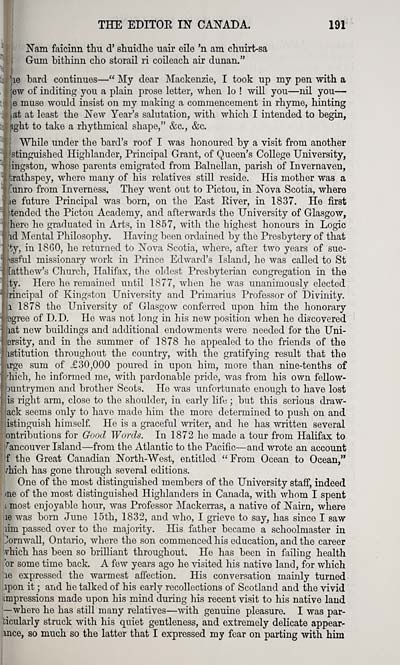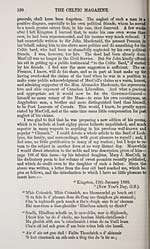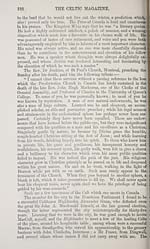Blair Collection > Celtic magazine > Volume 5
(201)
Download files
Complete book:
Individual page:
Thumbnail gallery: Grid view | List view

THE EDITOR IN CANADA. 191
Nam faicinn thu d' shuidhe uair eile 'n am chuirt-sa
Gum bithinn cho storail ri coileach air dunan."
' le bard continues — " My dear Mackenzie, I took up my pen with a
ow of inditing you a plain prose letter, when lo ! will you — nil you —
e muse would insist on my making a commencement in rhyme, hinting
at at least the New Year's salutation, with which I intended to begin,
ight to take a rhythmical shape," &c,, &c.
While under the bard's roof I was honoured by a visit from another
stinguished Highlander, Principal Grant, of Queen's CoUege University,
ingston, whose parents emigrated from Balnellan, parish of Invernaven,
srathspey, where many of his relatives still reside. His mother was a
Ainro from Inverness, They went out to Pictou, in Nova Scotia, where
le future Principal was born, on the East Eiver, in 1837. He first
■tended the Pictou Academy, and afterwards the University of Glasgow,
hero he graduated in Arts, in 1857, with the highest honours in Logic
id ]\Iental Philosophy. Having been ordained by the Presbytery of that
; ;ty, in 18G0, he returned to Nova Scotia, where, after tAvo years of suc-
%hssful missionary work in Prince Edward's Island, he was called to St
||[atthew's Church, Halifax, the oldest Presbyterian congregation in the
ty. Here he remained until 1877, when he was unanimously elected
rincipal of Kingston University and Primarius Professor of Divinity.
a 1878 the University of Glasgow conferred upon him the honorary
agree of D.D. Ho was not long in his new position when he discovered
lat new buildings and additional endowments were needed for the Uni-
ersity, and in the summer of 1878 he appealed to the friends of the
istitution throughout the country, with the gratifying result that the
irge sum of ,£30,000 poured in upon him, more than nine-tenths of
-hi( li, he informed me, with pardonable pride, was from his own feUow-
juiitiymen and brother Scots. He was unfortunate enough to have lost
is right arm, close to the shoulder, in early life ; but this serious draw-
ack seems only to have made him the more determined to push on and
istiiiguish himself He is a graceful writer, and he has written several
■ontributions for Good Words. In 1872 he made a tour from Halifax to
'''ancouver Island — from the Atlantic to the Pacific — and wrote an account
f the Great Canadian North- West, entitled "From Ocean to Ocean,"
yhicli has gone tlirough several editions.
One of the most distinguished members of the University staff", indeed
me of the most distinguished Highlanders in Canada, with whom I spent
t most enjoyable hour, was Professor Mackerras, a native of Nairn, where
lie was born June 15th, 1832, and who, I grieve to say, has since I saw
lim passed over to the majority. His father became a schoolmaster in
JornwaU, Ontario, where the son commenced his education, and the career
vhich has been so brilliant throughout. He has been in failing health
jbr some time back. A few years ago he visited his native land, for which
[le expressed the warmest affection. His conversation mainly turned
'ipon it ; and he talked of his early recollections of Scotland and the vivid
impressions made upon his mind during his recent visit to his native land
'—where he has still many relatives — with genuine pleasure. I was par-
ticularly struck with his quiet gentleness, and extremely delicate appear-
iince, so much so the latter that I expressed my fear on parting with him
Nam faicinn thu d' shuidhe uair eile 'n am chuirt-sa
Gum bithinn cho storail ri coileach air dunan."
' le bard continues — " My dear Mackenzie, I took up my pen with a
ow of inditing you a plain prose letter, when lo ! will you — nil you —
e muse would insist on my making a commencement in rhyme, hinting
at at least the New Year's salutation, with which I intended to begin,
ight to take a rhythmical shape," &c,, &c.
While under the bard's roof I was honoured by a visit from another
stinguished Highlander, Principal Grant, of Queen's CoUege University,
ingston, whose parents emigrated from Balnellan, parish of Invernaven,
srathspey, where many of his relatives still reside. His mother was a
Ainro from Inverness, They went out to Pictou, in Nova Scotia, where
le future Principal was born, on the East Eiver, in 1837. He first
■tended the Pictou Academy, and afterwards the University of Glasgow,
hero he graduated in Arts, in 1857, with the highest honours in Logic
id ]\Iental Philosophy. Having been ordained by the Presbytery of that
; ;ty, in 18G0, he returned to Nova Scotia, where, after tAvo years of suc-
%hssful missionary work in Prince Edward's Island, he was called to St
||[atthew's Church, Halifax, the oldest Presbyterian congregation in the
ty. Here he remained until 1877, when he was unanimously elected
rincipal of Kingston University and Primarius Professor of Divinity.
a 1878 the University of Glasgow conferred upon him the honorary
agree of D.D. Ho was not long in his new position when he discovered
lat new buildings and additional endowments were needed for the Uni-
ersity, and in the summer of 1878 he appealed to the friends of the
istitution throughout the country, with the gratifying result that the
irge sum of ,£30,000 poured in upon him, more than nine-tenths of
-hi( li, he informed me, with pardonable pride, was from his own feUow-
juiitiymen and brother Scots. He was unfortunate enough to have lost
is right arm, close to the shoulder, in early life ; but this serious draw-
ack seems only to have made him the more determined to push on and
istiiiguish himself He is a graceful writer, and he has written several
■ontributions for Good Words. In 1872 he made a tour from Halifax to
'''ancouver Island — from the Atlantic to the Pacific — and wrote an account
f the Great Canadian North- West, entitled "From Ocean to Ocean,"
yhicli has gone tlirough several editions.
One of the most distinguished members of the University staff", indeed
me of the most distinguished Highlanders in Canada, with whom I spent
t most enjoyable hour, was Professor Mackerras, a native of Nairn, where
lie was born June 15th, 1832, and who, I grieve to say, has since I saw
lim passed over to the majority. His father became a schoolmaster in
JornwaU, Ontario, where the son commenced his education, and the career
vhich has been so brilliant throughout. He has been in failing health
jbr some time back. A few years ago he visited his native land, for which
[le expressed the warmest affection. His conversation mainly turned
'ipon it ; and he talked of his early recollections of Scotland and the vivid
impressions made upon his mind during his recent visit to his native land
'—where he has still many relatives — with genuine pleasure. I was par-
ticularly struck with his quiet gentleness, and extremely delicate appear-
iince, so much so the latter that I expressed my fear on parting with him
Set display mode to: Large image | Transcription
Images and transcriptions on this page, including medium image downloads, may be used under the Creative Commons Attribution 4.0 International Licence unless otherwise stated. ![]()
| Early Gaelic Book Collections > Blair Collection > Celtic magazine > Volume 5 > (201) |
|---|
| Permanent URL | https://digital.nls.uk/76451263 |
|---|
| Description | Volume V, 1880. |
|---|---|
| Shelfmark | Blair.6 |
| Attribution and copyright: |
|
| Description | A selection of books from a collection of more than 500 titles, mostly on religious and literary topics. Also includes some material dealing with other Celtic languages and societies. Collection created towards the end of the 19th century by Lady Evelyn Stewart Murray. |
|---|
| Description | Selected items from five 'Special and Named Printed Collections'. Includes books in Gaelic and other Celtic languages, works about the Gaels, their languages, literature, culture and history. |
|---|

